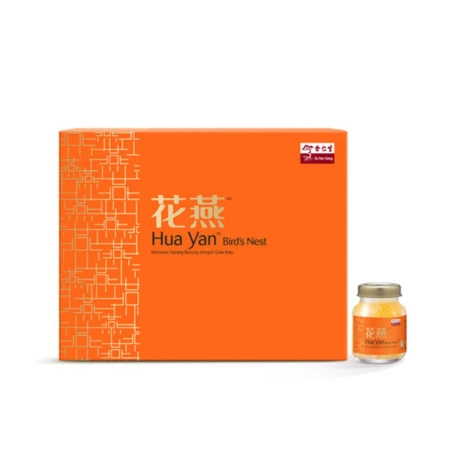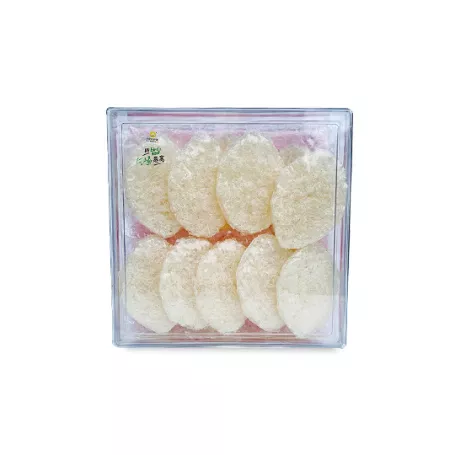Bird’s Nest: A Health Powerhouse or Just an Overpriced Myth? | Eu Yan Sang | BaiZiGui

Bird’s nest has long been regarded as a precious health supplement, revered for its alleged healing and rejuvenating properties. In the modern market, it continues to be highly sought after for its supposed benefits. However, the question remains: does bird’s nest truly live up to its reputation as a health powerhouse, or is it simply an overpriced placebo—a "brain tax" for the gullible? This article will take a deep dive into the topic, exploring the nutritional value, scientific evidence, and market trends surrounding bird’s nest.
Bird’s Nest as a Health Supplement: Science or Myth?
Bird’s nest has earned a reputation as a luxury health product, particularly in East and Southeast Asia, where it is believed to have numerous health benefits. But are these claims scientifically supported, or are they rooted in cultural tradition rather than fact?
A. Rich in Nutritional Value, Nourishing and Rejuvenating
Bird’s nest is known for its high protein content and unique composition of bioactive compounds, which contribute to its status as a highly prized health supplement. The main components that make bird’s nest a celebrated health food include:
- High Protein Content: Bird’s nest is rich in quality proteins that are essential for cell regeneration and tissue repair. This makes it particularly useful for those recovering from illness, postpartum mothers, and individuals looking to improve their skin’s elasticity and overall health.
- Epidermal Growth Factor (EGF): Bird’s nest contains natural EGF, a substance known to promote cell division and regeneration. This factor is often linked to immune system enhancement, faster tissue repair, and anti-aging properties.
- Sialic Acid: Sialic acid, found in significant quantities in bird’s nest, plays an important role in enhancing cognitive function and boosting the immune system. It is especially beneficial for pregnant women and infants, as it aids in the development of the brain and supports overall immune health.
The combination of these nutrients positions bird’s nest as a powerhouse for overall well-being, particularly for those focused on beauty, anti-aging, and recovery.
B. Scientific Support and Skepticism
While bird’s nest has long been revered in traditional Chinese medicine, modern scientific studies offer a mix of support and skepticism regarding its health benefits:
- Research Findings: Some studies show that the sialic acid in bird’s nest may indeed enhance cognitive abilities, particularly in pregnant women and their children. Sialic acid is believed to promote neural development in infants, making bird’s nest a sought-after supplement for expecting mothers.
- Scientific Skepticism: Despite some supportive studies, a portion of the scientific community remains cautious about bird’s nest’s purported health benefits. Critics argue that there is a lack of large-scale clinical trials to definitively prove the effectiveness of bird’s nest in improving overall health. Additionally, some argue that not all bird’s nest products on the market contain enough bioactive compounds to produce the desired results, particularly when lower-quality bird’s nest is used.
The efficacy of bird’s nest remains a topic of debate, with many experts calling for more comprehensive research to better understand its true health benefits.
C. Psychological and Cultural Value of Bird’s Nest
Apart from its nutritional benefits, bird’s nest also holds significant psychological and cultural value, particularly in East Asian communities.
- Cultural Significance: Bird’s nest has long been associated with royalty and the elite in Chinese culture. It is often served as a delicacy at prestigious events and is regarded as a symbol of luxury, prosperity, and health. Its historical association with the upper class has only added to its appeal as a health product.
- Psychological Comfort: In today’s society, the pursuit of wellness and longevity has created a culture that embraces products like bird’s nest, not just for their nutritional benefits but also for the sense of security they provide. For many consumers, purchasing and consuming bird’s nest is about more than just its physical effects—it offers reassurance and a sense of well-being, fulfilling a psychological need for health enhancement.
The Current Market: Bird’s Nest Popularity and Consumption Trends
In recent years, bird’s nest has seen a resurgence in popularity, especially in countries like Malaysia, Singapore, and China, where the wellness industry is booming. The bird’s nest market has expanded rapidly, driven by increased consumer demand for natural health products and the rising importance placed on preventive healthcare.
A. Growth of the Bird’s Nest Market in Malaysia
Malaysia is one of the leading producers and exporters of bird’s nest globally, particularly prized for the swiftlet nests harvested in the country. The unique environment and rich natural resources allow for the production of high-quality bird’s nest, making it a popular commodity both locally and internationally.
In 2023, the bird’s nest market in Malaysia grew by 15%, reflecting a strong and steady demand for the product. Major brands like Eu Yan Sang have played a crucial role in ensuring the availability of premium bird’s nest products, offering consumers peace of mind through stringent quality control measures and certifications. As one of the most trusted traditional Chinese medicine brands, Eu Yan Sang offers bird’s nest products that are known for their purity and effectiveness.
The growth of e-commerce platforms has also contributed to the increasing accessibility of bird’s nest, making it easier for consumers to purchase and enjoy this luxurious supplement from the comfort of their homes. With online platforms facilitating more transparent product information, including certifications of authenticity, consumers can now make more informed purchasing decisions.
B. The Younger Generation’s Interest in Bird’s Nest
While bird’s nest was traditionally consumed by older adults or those recovering from illness, it has seen a significant rise in popularity among younger consumers in recent years. This shift is largely driven by the increasing focus on preventive health care, beauty, and wellness among millennials and Gen Z consumers.
Social media platforms, such as Instagram and TikTok, have further contributed to the growth of bird’s nest consumption among younger generations. Influencers and health enthusiasts frequently share the benefits of bird’s nest in promoting glowing skin, enhancing vitality, and boosting immunity. As a result, bird’s nest has become a fashionable choice for younger consumers looking to invest in their long-term health and wellness.
FAQs About Bird’s Nest
1. Who is bird’s nest suitable for?
Bird’s nest is suitable for a wide range of people, particularly pregnant women, the elderly, and women who are focused on beauty and health. It helps boost the immune system, improve skin elasticity, and assist in physical recovery. It is also recommended for those with compromised immune systems or those recovering from illness.
2. How can I tell if a bird’s nest product is high quality?
High-quality bird’s nest typically has a natural ivory or light yellow hue and a slightly translucent appearance. When soaked, high-quality bird’s nest will expand significantly, becoming elastic and fibrous. Avoid bird’s nests that are unnaturally white or overly bleached, as they may have undergone chemical processing.
3. Can bird’s nest be consumed daily?
While bird’s nest is highly nutritious, it is best consumed in moderation. A recommended serving is about 3-5 grams of dried bird’s nest, taken 2-3 times a week. Regular, moderate consumption provides optimal health benefits, while overconsumption may lead to digestive discomfort.
4. When is the best time to consume bird’s nest?
Bird’s nest is best consumed on an empty stomach, particularly in the morning or before bed. This allows the body to absorb the nutrients more effectively, providing maximum benefits.
5. Does bird’s nest truly benefit pregnant women?
Yes, research suggests that the nutrients in bird’s nest, particularly sialic acid, can support fetal brain development and enhance the immune system of both the mother and baby. Many pregnant women incorporate bird’s nest into their diet as a natural supplement to support a healthy pregnancy.
Conclusion: Smart Choices for Health
In conclusion, bird’s nest is not just a traditional health supplement but also a modern symbol of wellness and luxury. While some claims about bird’s nest’s benefits may be exaggerated, its high protein content, sialic acid, and other nutrients do provide tangible health benefits for specific groups, particularly pregnant women and individuals focused on recovery and beauty. By choosing reputable brands such as Eu Yan Sang, consumers can ensure they are purchasing authentic, high-quality bird’s nest products and can genuinely experience its nourishing benefits.
Baizigui’s Recommendation for Premium Bird’s Nest
As a leading health and wellness platform, Baizigui offers premium bird’s nest products from trusted brands like Eu Yan Sang. We carefully select only the finest bird’s nest, ensuring that each product delivers on its promise of nourishment and health enhancement. Whether you are looking for a daily supplement to boost immunity or a beauty product to rejuvenate your skin, Baizigui has a bird’s nest product to meet your needs.
Act now and visit Baizigui’s website or retail store to shop for the highest quality bird’s nest products. Embrace the health benefits and enjoy the luxury of this prized supplement as part of your everyday wellness routine!

 Bahasa melayu
Bahasa melayu 中文
中文
























